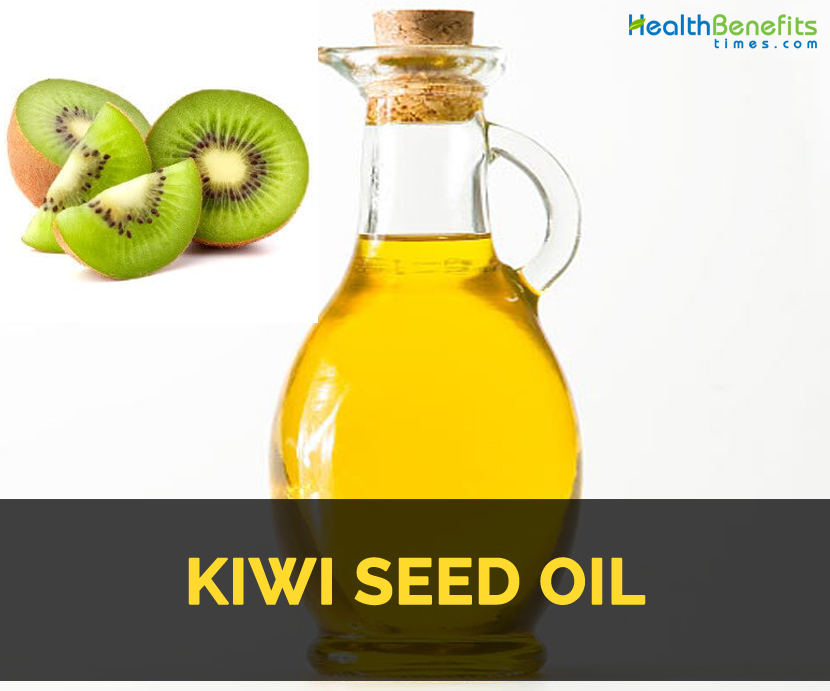History
It was originated from Southern and Central regions of China and got introduced in early 20th century to New Zealand. The main exporter of Kiwi fruit is New Zealand. This fruit was named kiwi as the fruit look like kiwi chick. The Kiwi fruit was known to Japan in 1966 and in late 1970’s they started cultivation. Japan produces approximately 40000 tonnes of Kiwi fruits in a year.
Health Benefits of Kiwi seed oil
- It promotes skin elasticity, lowers skin lines, dryness and wrinkles.
- It helps in regeneration process of skin cells.
- It provides relief from scaly, itchy and irritated skin conditions such as psoriasis and eczema.
- It helps to treat blotches, wrinkles, acne, large pores, skin blemishes and dark spots.
- It prevents loss of moisture, promotes silky soft hair and adds suppleness and elasticity.
Precautions
- The people allergic to Kiwi fruit, hazelnuts, latex, avocados, wheat, poppy seeds and figs should avoid this oil.
- Use it in moderate amounts.
- Excessive use of Kiwi seed oil results in diarrhea, nausea and vomiting.
- Pregnant and lactating mothers should consult the doctor for use.
- It might cause swelling and skin rashes.
Kiwi seed oil facts
Kiwi seed oil has high content of essential fatty acids such as linolenic acid and alpha linolenic acid. It has moisturizing and nourishing properties that helps to treat dry, aging and damaged skin. It is also useful to treat dry, lifeless and brittle hair. The antioxidant found in this oil eliminates free radicals which are the cause for cell damage and degeneration. It has high concentration of Vitamin C that assist in the formation of collagen which provides firmness to the skin that lowers the chances of skin aging. This oil possesses various nutrients and vitamins that prevent the hair problems such as rough, dry hair and dandruff.
| Kiwi Seed Oil facts and benefits Quick Facts | |
|---|---|
| Name: | Kiwi Seed Oil facts and benefits |
| Origin | It was originated from Southern and Central regions of China and got introduced in early 20th century to New Zealand. |
| Colors | Clear, yellow |
| Health benefits | Promotes skin elasticity, Lowers skin lines, Dryness, Wrinkles, Regeneration of skin cells |
| Name | Kiwi Seed Oil facts and benefits |
|---|---|
| Scientific Name of Kiwi fruit | Actinidia chinensis |
| Native | It was originated from Southern and Central regions of China and got introduced in early 20th century to New Zealand. The main exporter of Kiwi fruit is New Zealand. |
| Common/English Names of Kiwi fruit | Chinese gooseberry, Macaque pear, Macaque peach, Vine pear, Wood berry, Sunny peach, Unusual fruit, Hairy bush fruit, Wonder fruit |
| Name in Other Languages of Kiwi fruit | Albanian: kivi; Basque: kiwi; Belarusian: kivi (ківі); Bosnian: kivi; Bulgarian: kivi (киви); Catalan: kiwi; Czech: kiwi; Croatian: kivi; Dutch: kiwi; Danish: kiwi; Estonian: kiivi; French: kiwi; Finnish: kiivi; Galician: kiwi; Greek: aktinídia (ακτινίδια); German: Kiwi; Hungarian: kiwi; Irish: kiwi; Icelandic: Kiwi; Italian: kiwi; Lithuanian: kiviai; Latvian: kivi; Macedonian: kivi (киви); Norwegian: kiwi; Maltese: kiwi; Polish: kiwi; Romanian: kiwi; Portuguese: kiwi; Russian: kivi (киви); Serbian: kivi (киви); Slovak: kiwi; Spanish: kiwi; Slovenian: kiwi; Swedish: kiwi; Welsh: ciwi; Ukrainian: kivi (ківі); Yiddish: kivi (קיווי); Azerbaijani: kivi; Armenian: kivi (կիվի); Bengali: Ki’u’i (কিউই); Georgian: kivi (კივი); Chinese: Míhóutáo (猕猴桃); Hindi: keevee (कीवी); Gujarati: Kivi (કિવિ); Hmong: kiwi; Kannada: Kivi (ಕಿವಿ); Japanese: Kiuifurūtsu (キウイ); Khmer: satv khi vi (សត្វឃីវី); Kazakh: kïvï (киви); Korean: kiwi (키위); Malayalam: kivi (കിവി); Lao: kiwi; Marathi: Kivī (किवी); Mongolian: Kivi (Киви); Nepali: kiwi; Myanmar (Burmese): kewe see (ကီဝီသီး); Sinhala: kīvi (කීවි); Tamil: Kivi (கிவி); Tajik: kivi (киви); Thai: Nk kīwī (นกกีวี); Telugu: Kivi (కివి); Uzbek: kivi; Vietnamese: kiwi; Turkish: kivi; Arabic: kayawi (كيوي); Afrikaans: kiwi; Hausa: kiwi; Chichewa: kiwi; Igbo: kiwi; Somali: kiwi; Sesotho: kiwi; Yoruba: KIWI; Swahili: kiwi; Zulu: ikiwi; Filipino: kiwi; Cebuano: kiwi; Javanese: kiwi; Indonesian: kiwi Malagasy: kiwi; Maori: kiwi; Malay: kiwi; Esperanto: kivo; Latin: kiwi; Haitian Creole: kiwi; |
| Extraction method | Cold pressed |
| Color | Clear, yellow |
| Aroma | Pleasant, fruity |


